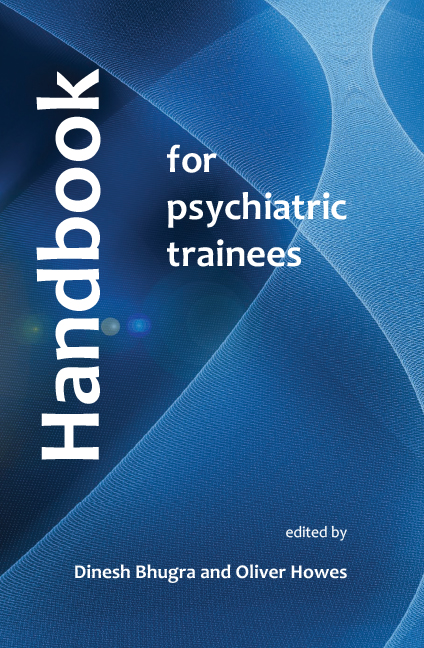Book contents
- Frontmatter
- Contents
- List of tables, boxes and figures
- List of contributors
- 1 Psychiatric training: the next steps
- Part 1
- Part 2
- Part 3
- 14 Personal safety
- 15 Managing violence
- 16 Managing difficult clinical situations
- 17 Understanding and managing stress
- 18 Managing time: the key to professional success
- 19 Negotiation skills
- 20 Presentation skills
- 21 Mental health review tribunals: reports and hearings
- 22 How to get published
- 23 Mental health informatics
- 24 Clinical governance
- 25 Lifelong learning and revalidation
- 26 Mentoring and shadowing
- 27 The MRCPsych examinations
- 28 Flexible training
- 29 UK training for overseas doctors and opportunities for UK doctors to train outside the EEC
- 30 Academic careers
- 31 Higher degrees
- Index
22 - How to get published
from Part 3
- Frontmatter
- Contents
- List of tables, boxes and figures
- List of contributors
- 1 Psychiatric training: the next steps
- Part 1
- Part 2
- Part 3
- 14 Personal safety
- 15 Managing violence
- 16 Managing difficult clinical situations
- 17 Understanding and managing stress
- 18 Managing time: the key to professional success
- 19 Negotiation skills
- 20 Presentation skills
- 21 Mental health review tribunals: reports and hearings
- 22 How to get published
- 23 Mental health informatics
- 24 Clinical governance
- 25 Lifelong learning and revalidation
- 26 Mentoring and shadowing
- 27 The MRCPsych examinations
- 28 Flexible training
- 29 UK training for overseas doctors and opportunities for UK doctors to train outside the EEC
- 30 Academic careers
- 31 Higher degrees
- Index
Summary
Writing this chapter has a well-defined purpose: to help you get your research results published. There are a lot of books teaching you how to do this, and reading these books gives you the impression that publishing is easy. In a way it is easy, especially afterwards. But when you have had a manuscript rejected for the third time it definitely does not feel easy. When you are senior, with a long list of publications behind you, and journals invite you to write articles you will forget how difficult it is to publish a paper. Unfortunately, it is at this stage of your career that you start writing books about ‘how to publish’. I promise I shall not tell you what to do, but instead try to remember some of my own troubles – and defeats – and honestly admit that it is difficult, but also a great thrill when you have your first publication in your hand.
I always completely lose interest in a research project at the very moment the analyses have been finished and the results established. Writing the manuscript presents an overwhelming psychological burden. However, because doing a research project without publishing the results is defined as unethical behaviour (almost as unethical as being an academic and not doing research) there is nothing but to write the manuscript.
Over the years, I have tried to set up some tricks to fool myself – more or less successfully – into writing, and more importantly writing in a way that leads to publication. These tricks, learned from experience over the years, have been supplemented by experience from editing scientific journals, from 1994 to 1998 as Danish editor of the Nordic Journal of Psychiatry and from 1998 onwards as editor of the Acta Psychiatrica Scandinavica.
Writing the manuscript
Writing to avoid being beaten up by your superego
A basic way to get things done is to be born Scandinavian. In Scandinavia we are raised and trained from cradle to nursing home to feel guilty, and our terrorist superegos help us get things done, in the case of manuscripts, especially if we have demanding co-authors waiting (but be wary of dynamic psychotherapy training – it can help you learn very useful ways to make your co-authors feel guilty but will eventually reduce the effectiveness of your superego in motivating you).
- Type
- Chapter
- Information
- Handbook for Psychiatric Trainees , pp. 203 - 215Publisher: Royal College of PsychiatristsPrint publication year: 2008



